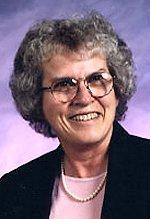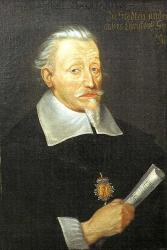Planning worship?
Check out our sister site, ZeteoSearch.org,
for 20+ additional resources related to your search.
- |
User Links
Person Results
George J. Elvey

1816 - 1893 Composer of "DIADEMATA" in Christian Worship George Job Elvey (b. Canterbury, England, 1816; d. Windlesham, Surrey, England, 1893) As a young boy, Elvey was a chorister in Canterbury Cathedral. Living and studying with his brother Stephen, he was educated at Oxford and at the Royal Academy of Music. At age nineteen Elvey became organist and master of the boys' choir at St. George Chapel, Windsor, where he remained until his retirement in 1882. He was frequently called upon to provide music for royal ceremonies such as Princess Louise's wedding in 1871 (after which he was knighted). Elvey also composed hymn tunes, anthems, oratorios, and service music.
Bert Polman
George J. Elvey
Ralph Vaughan Williams

1872 - 1958 Harmonizer of "FOREST GREEN" in Psalms and Hymns to the Living God Through his composing, conducting, collecting, editing, and teaching, Ralph Vaughan Williams (b. Down Ampney, Gloucestershire, England, October 12, 1872; d. Westminster, London, England, August 26, 1958) became the chief figure in the realm of English music and church music in the first half of the twentieth century. His education included instruction at the Royal College of Music in London and Trinity College, Cambridge, as well as additional studies in Berlin and Paris. During World War I he served in the army medical corps in France. Vaughan Williams taught music at the Royal College of Music (1920-1940), conducted the Bach Choir in London (1920-1927), and directed the Leith Hill Music Festival in Dorking (1905-1953). A major influence in his life was the English folk song. A knowledgeable collector of folk songs, he was also a member of the Folksong Society and a supporter of the English Folk Dance Society. Vaughan Williams wrote various articles and books, including National Music (1935), and composed numerous arrangements of folk songs; many of his compositions show the impact of folk rhythms and melodic modes. His original compositions cover nearly all musical genres, from orchestral symphonies and concertos to choral works, from songs to operas, and from chamber music to music for films. Vaughan Williams's church music includes anthems; choral-orchestral works, such as Magnificat (1932), Dona Nobis Pacem (1936), and Hodie (1953); and hymn tune settings for organ. But most important to the history of hymnody, he was music editor of the most influential British hymnal at the beginning of the twentieth century, The English Hymnal (1906), and coeditor (with Martin Shaw) of Songs of Praise (1925, 1931) and the Oxford Book of Carols (1928).
Bert Polman
Ralph Vaughan Williams
Marty Haugen
b. 1950 Author of "Psalm 47: God Mounts His Throne" in RitualSong (2nd ed.) Marty Haugen (b. 1950), is a prolific liturgical composer with many songs included in hymnals across the liturgical spectrum of North American hymnals and beyond, with many songs translated into different languages. He was raised in the American Lutheran Church, received a BA in psychology from Luther College, yet found his first position as a church musician in a Roman Catholic parish at a time when the Roman Catholic Church was undergoing profound liturgical and musical changes after Vatican II. Finding a vocation in that parish to provide accessible songs for worship, he continued to compose and to study, receiving an MA in pastoral studies at the University of St. Thomas in St. Paul Minnesota. A number of liturgical settings were prepared for the Evangelical Lutheran Church in America and more than 400 of his compositions are available from several publishers, especially GIA Publications, who also produced some 30 recordings of his songs. He is composer-in-residence at Mayflower Community Congregational Church in Minneapolis and continues to compose and travel to speak and teach at worship events around the world.
Emily Brink
Marty Haugen
Gregory Murray
1905 - 1992 Person Name: A. Gregory Murray Composer of "[Clap your hands, all ye peoples]" in Hymns for a Pilgrim People
Gregory Murray
Claude Goudimel

1514 - 1572 Harmonizer of "GENEVAN 47" in The Presbyterian Hymnal The music of Claude Goudimel (b. Besançon, France, c. 1505; d. Lyons, France, 1572) was first published in Paris, and by 1551 he was composing harmonizations for some Genevan psalm tunes-initially for use by both Roman Catholics and Protestants. He became a Calvinist in 1557 while living in the Huguenot community in Metz. When the complete Genevan Psalter with its unison melodies was published in 1562, Goudimel began to compose various polyphonic settings of all the Genevan tunes. He actually composed three complete harmonizations of the Genevan Psalter, usually with the tune in the tenor part: simple hymn-style settings (1564), slightly more complicated harmonizations (1565), and quite elaborate, motet-like settings (1565-1566). The various Goudimel settings became popular throughout Calvinist Europe, both for domestic singing and later for use as organ harmonizations in church. Goudimel was one of the victims of the St. Bartholomew's Day massacre of Huguenots, which occurred throughout France.
Bert Polman
Claude Goudimel
Joy F. Patterson

b. 1931 Paraphaser of "Peoples, Clap Your Hands!" in The Presbyterian Hymnal Joy F. Patterson (b. 1931), of Wassau, Wisconsin, is an elder in the Presbyterian Church who has written many texts and tunes; twenty-nine are collected in Come, You People of the Promise (Hope Publishing, Co., 1994); another collection, Teach Our Eyes New Ways of Seeing, was published in 2005 (Selah). Patterson has enjoyed a varied career as a French professor, homemaker, and claim representative for the Social Security Administration.
Sing! A New Creation
Joy F. Patterson
James Chepponis
b. 1956 Person Name: James J. Chepponis Composer of "[All peoples, clap your hands]" in Worship (4th ed.)
James Chepponis
Christopher Webber
b. 1932 Person Name: Christopher L. Webber Author of "All Peoples, Clap Your Hands" in Christian Worship
Christopher Webber
Gracia Grindal

b. 1943 Author of "O Clap Your Hands" in Christian Worship Gracia Grindal (b. Powers Lake, ND, 1943). Grindal was educated at Augsburg College, Minneapolis, Minnesota; the University of Arkansas; and Luther-Northwestern Seminary, St. Paul, Minnesota, where she has served since 1984 as a professor of pastoral theology and communications. From 1968 to 1984 she was a professor of English and poet-in-residence at Luther College, Decorah, Iowa. Included in her publications are Sketches Against the Dark (1981), Scandinavian Folksongs (1983), Lessons in Hymnwriting (1986, 1991), We Are One in Christ: Hymns, Paraphrases, and Translations (1996), Good News of Great Joy: Advent Devotions for the Home (1994 with Karen E. Hong), Lina Sandell, the Story of Her Hymns (2001 with John Jansen), and A Revelry of Harvest: New and Selected Poems (2002). She was instrumental in producing the Lutheran Book of Worship (1978) and The United Methodist Hymnal (1989).
Bert Polman
Gracia Grindal
Paul Inwood
b. 1947 Person Name: Paul Inwood, b. 1947 Author (refrain) of "Psalm 47: God Mounts His Throne" in Glory and Praise (3rd. ed.)
Paul Inwood
H. Ricardo Ramirez
Author of "God mounts his throne to shouts of joy" in Church Hymnary (4th ed.)
H. Ricardo Ramirez
Liam Affley
Person Name: LA Composer of "[All peoples, clap your hands]" in Catholic Book of Worship III
Liam Affley
Joseph B. Sullivan
Composer of "[All you peoples, clap your hands]" in One in Faith
Joseph B. Sullivan
Heinrich Schütz

1585 - 1672 Composer of "[O clap your hands, all peoples shout]" in Christian Worship Heinrich Schütz (baptized Oct. 9, 1585-1672) was the greatest German composer of the seventeenth century and the first to reach international prominence. His influence was felt for more than two centuries after his death.
In 1598, after hearing the young Henrich sing, the Landgrave Moritz of Hessen-Kassel began a campaign to have the boy study at Kassel. In 1599, Christoph Schütz took his son to the landgrave’s seat, where he served as a choirboy and pursued his education showing particular facility in Greek, Latin, and Frence. After he lost his treble voice, he set out for the University of Marburg, where he studied law. But under the sponsorship of the landgrave, Heinrich went to Venice (1609) and studied with Giovanni Gabrieli until Gabrieli’s death in 1612. In 1613 he returned to Germany, once again studying law while serving as organist to the landgrave. He was lent to Johann Georg I of Saxony (1614) and subsequently became director of the chapel, a position he held the rest of his life. The untimely death of his wife after six years of marriage (1625) led him to devote himself to the composition of church music. After several petitions Schütz was granted leave to study with Claudio Monteverdi and once again set out for Venice. For much of his life the Thirty Years’ War obstructed his work, and he spent time moving from court to court in Europe, finally settling in Dresden in 1641, where he died.
--The Presbyterian Hymnal Companion, 1993
Heinrich Schütz
Ewald Bash
1924 - 1994 Author of "Clap your hands, all peoples" Ewald J. Bash (Indiana, 1924-- ). A poet and also an occasional writer of folk melodies, his personal interests arose in the era of return to genuine folk music of the early Sixties and continued into the Seventies during the time of turmoil and crisis. His lyrics, set to a Latvian folk song, "Hymn for Those in Captivity," appears in Cantate Domine. He also composed hymns which have appeared in the hymnals of a number of communions. He was part of a folk liturgical movement in the Lutheran Church and contributed much to a development of such moods in an early work, Songs for Today. Certain of his work has also appeared in Jerusalem/Babylon: Handbook for a Christian in the Urban World.
--Ewald J. Bash, DNAH Archives
In a letter from Bash to Mary Louise VanDyke dated 12 January 1987, he states:
"'Hymn for Those in Captivity' was written in the throes of those early days of the Sixties. I actually don't remember how it all happened that well. I was writing a lot of songs. But the melody I had learned from Latvian peoples who came as Displaced Persons from Germany &, of course, Latvia in 1940. She had been the wife of the Latvian ambassador to Russia (they came to my first parish in New Lexington, Ohio. The song in its original words & its translation were hauntingly beautiful:
Who is crying, what lamenting
Sounds so sadly in the night
'Tis the orphan children crying
Bound beneath their master's might.
I also had learned the first verse in Latvian. But Psalm 137 fit the music well and well, the words came. And for the U.S. in the 1960's it felt right; as well as for South Africa and other places today."
--DNAH Archives
Ewald Bash
David T. Koyzis

b. 1955 Person Name: David T Koyzis Author of "Clap Your Hands, All You Peoples of the Earth" in Scripture Song Database
David T. Koyzis
Ugo Nakada
1896 - 1974 Composer of "GI NO TAIYO" in E. A. C. C. Hymnal Ugo Nakada was a Japanese pastor and hymnwriter out of the holiness movement. Son of the Rev. Juji Nakada of the Japanese Holiness Church.
Email to Hymnary
Ugo Nakada


 My Starred Hymns
My Starred Hymns



